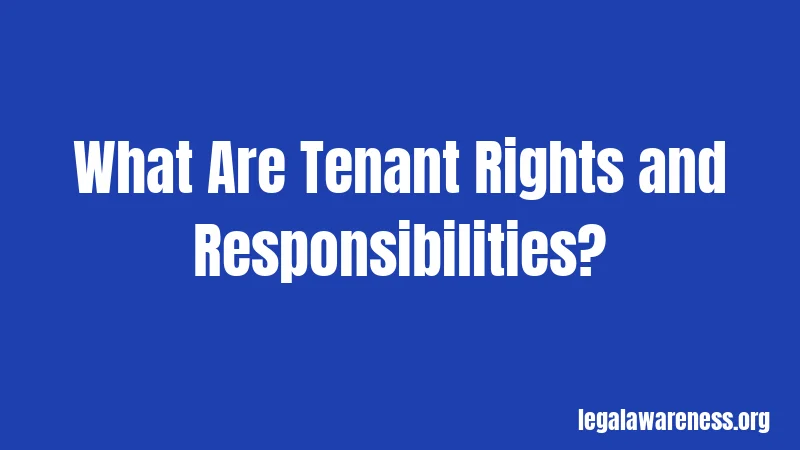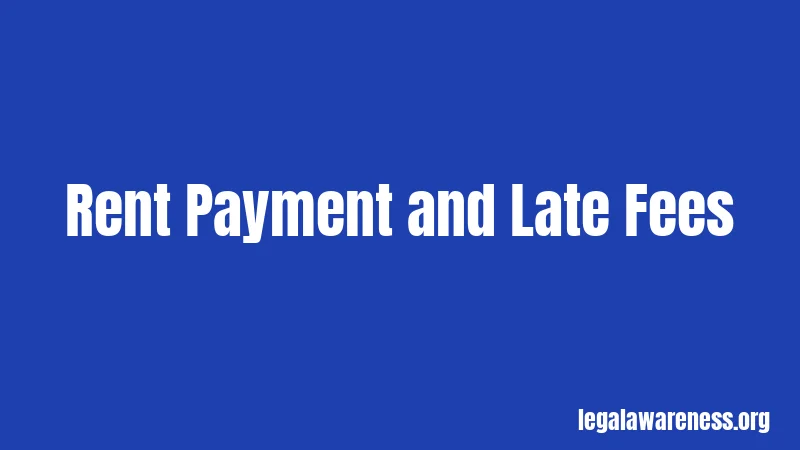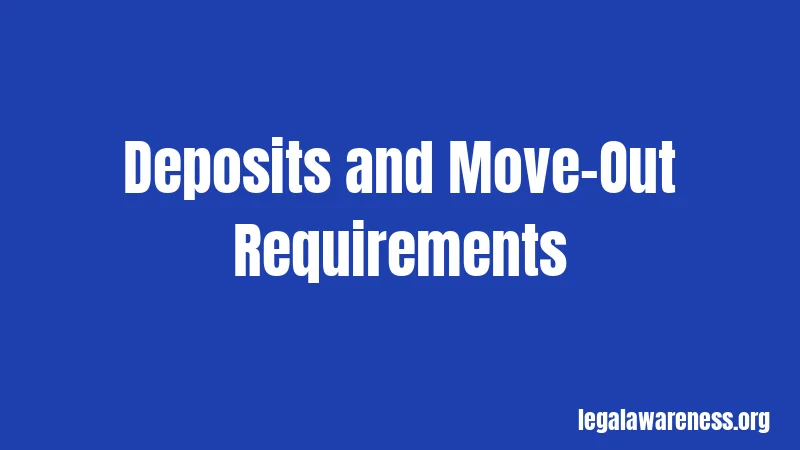Wisconsin Tenant Laws (2026): Your Rights and Responsibilities
If you’re renting in Wisconsin, honestly, this information matters more than you might think. Most renters have no idea what their landlord can and can’t actually do. But Wisconsin has pretty solid tenant protections. Let’s break down exactly what you need to know so you can stand up for yourself.
Wisconsin’s tenant laws cover everything from security deposits to evictions. Understanding these rules protects you from bad landlords. It also helps you know what your responsibilities are. Trust me, knowing this stuff can save you money and headaches.
What Are Tenant Rights and Responsibilities?

Okay, pause. Let me explain this clearly. Tenant rights are the legal protections you have as a renter. They cover things like safe living conditions, privacy, and getting your deposit back. Your responsibilities are the things you must do as a tenant. This includes paying rent on time and not damaging the apartment. Think of it like a traffic agreement between you and your landlord.
Wisconsin law gives tenants strong protections. These rules apply to most rental properties in the state. However, some exemptions exist. Owner-occupied buildings with four or fewer units may have different rules.
Basic Wisconsin Tenant Laws
Right to a Habitable Rental Unit
Here’s where it gets interesting. Your landlord must provide a dwelling that’s fit for living. This means the rental unit must meet health and safety codes. It needs working plumbing, heat, and electricity. The building must be structurally sound with no dangerous conditions.
Wondering what counts as a problem? Broken windows, mold, pest infestations, and no heat in winter are all violations. Your landlord must fix these issues within a reasonable time. Typically, that means within 10 to 14 days. If your landlord ignores the problem, you can contact your local health department or take legal action.
Security Deposits in Wisconsin
Your landlord can collect a security deposit. But here’s the important part. Wisconsin law is very specific about how deposits must be handled. Your landlord must put your deposit in a separate account. It cannot be mixed with their personal money.
Here’s what else matters. Your landlord must either return your full deposit within 21 days of you moving out. Or they must send you an itemized list explaining what money they’re keeping. The list must show specific damages or unpaid rent. They can only deduct for actual damage beyond normal wear and tear. Normal wear and tear is not deductible.
This part surprises most people. If your landlord doesn’t follow these deposit rules, you can sue them. You might recover the deposit amount plus interest. You could also get damages up to twice the deposit amount. So yeah, landlords take this pretty seriously.
Right to Privacy
Your landlord cannot just walk into your apartment whenever they feel like it. That’s a violation of your right to privacy. Landlords can only enter for legitimate reasons. These include showing the unit to prospective tenants, making repairs, or handling emergencies.
Here’s the key thing. They need to give you notice first. Wisconsin law says landlords must give 12 hours’ notice before entering. The notice should be in writing. It should explain why they’re entering and when they’ll come. Emergency entries don’t require notice. A fire, gas leak, or flood count as emergencies.
Rent Payment and Late Fees

When and How Rent Is Due
Your lease spells out when rent is due. Most commonly, it’s due on the first of each month. Make sure you understand your lease terms. Pay attention to where the rent check goes. Some landlords want checks mailed. Others want payments made online.
Wisconsin law protects you from unfair late fees. Landlords can charge late fees, but they must be reasonable. The fee cannot be more than 5% of the monthly rent. So if you pay $1,000 per month, the late fee is no more than $50. Landlords can’t charge you for being five days late if your lease says rent is due on the first. They usually need to wait until you’re seven or more days late.
Rent Increases
Your landlord wants to raise your rent. Sound familiar? In Wisconsin, your landlord can raise rent. But they must follow rules. Month-to-month tenancies can have rent increases. However, your landlord must give you 28 days’ written notice.
Wait, it gets better. Fixed-term leases are locked in. If you signed a one-year lease, your rent cannot go up during that year. This is actually pretty straightforward. Read your lease carefully. Know when it ends. Then you know when changes can happen.
Evictions in Wisconsin
When Landlords Can Evict You
Hold on, this part is important. Your landlord cannot just throw you out. Wisconsin law requires a formal eviction process. Your landlord must have a legal reason to evict you. These reasons include nonpayment of rent, lease violations, or the landlord’s desire to occupy the unit themselves.
Here’s the thing. Even if your landlord owns the building, they must follow proper procedures. They cannot lock you out or remove your belongings. Illegal evictions can result in fines and legal action against them.
The Eviction Process
Wisconsin requires landlords to follow strict procedures. First, they must give you notice. The notice period depends on the reason for eviction. For nonpayment of rent, landlords must give five days’ notice. For other lease violations, they typically need to give 14 days’ notice to cure the problem. That means you get 14 days to fix the issue.
If you don’t pay or fix the problem, your landlord files in court. You get a court date. You can defend yourself. You can present evidence that you paid the rent or fixed the problem. The judge decides. Only after the judge rules in the landlord’s favor can eviction happen. This whole process takes at least several weeks. It’s not quick.
Deposits and Move-Out Requirements

Understanding What Can Be Deducted
Not all deductions are legal. Your landlord can deduct for unpaid rent and actual damage. Repainting the entire apartment after move-out is usually fair wear and tear. The landlord’s responsibility, not yours. But holes from nails? That’s your problem.
The difference matters. Normal use of an apartment means some wear. Carpet fades. Paint yellows. These costs are the landlord’s. But if you punch a hole in the wall or stain the carpet with something permanent, that’s damage. You pay for it.
Getting Your Deposit Back
You’re moving out in three weeks. Here’s what to expect. Take photos and video of the unit in move-out condition. Document existing damage. This protects you. Send these to your landlord.
Your landlord has 21 days to return your deposit or send an explanation. If they keep money, that itemized list must be detailed. It should describe each damage. It should explain the cost. Vague explanations don’t hold up legally. “General damages” without specifics won’t work.
Got no itemized list back? Your landlord broke the law. You can sue for the full deposit plus interest and damages. Many small claims court victories happen this way.
Lease Agreements and Tenant Responsibilities
What Must Be in a Wisconsin Lease
Most leases include standard items. Your name, the landlord’s name, the address, and the rental term go at the top. The lease covers rent amount, due date, and utilities. It explains lease violations and potential consequences.
Wisconsin law says leases must include specific notices. Your landlord must include a “landlord’s notice of rent payment address and procedures.” This tells you exactly where to pay. It must include information about deposits. The lease must explain how deposits are handled.
Some things cannot be in a lease. Your landlord cannot make you waive your right to a safe apartment. They cannot make you agree to illegal clauses. For example, a clause saying you can’t call police or contact government agencies is unenforceable.
Your Responsibilities as a Tenant
You’ve got responsibilities too. Pay rent on time, obviously. Keep the apartment clean and sanitary. Don’t damage the unit beyond normal wear and tear. Report maintenance issues quickly. Don’t disturb neighbors. Follow community rules.
Use utilities reasonably. Don’t run up bills on purpose or waste water. Keep the apartment free from pest infestations. You maintain it for yourself. This is fair. Your landlord maintains the structure and systems. You maintain cleanliness and care.
Maintenance and Repairs
How Long Repairs Must Take
Your toilet is running constantly. Water’s wasting. You call the landlord. Wisconsin law says landlords must respond to maintenance requests. Landlords must make repairs within a reasonable time. The “reasonable time” depends on the issue.
For urgent problems like no heat in winter or no hot water, landlords must act fast. Like within days. For minor issues, you might have 10 to 14 days. The more serious the problem, the faster the landlord must move.
Repairs seriously affecting health and safety get top priority. No heat when it’s freezing? Emergency. Slow drain that works fine? Not an emergency. The law recognizes this difference.
What Happens If Your Landlord Won’t Repair
You’ve asked twice. Your landlord ignores you. What now? Wisconsin lets tenants take action. You can repair and deduct from rent. This means you pay someone to fix the problem. Then you deduct that cost from your rent. But follow rules carefully.
First, give your landlord written notice. They get a reasonable chance to fix it. Wait that period. If nothing happens, then you can repair and deduct. Keep receipts and invoices. Do not deduct more than one month’s rent this way. And do not use this more than once per 12-month period. Landlords actually pay attention to these limits.
Another option is contacting local health or building inspectors. They can order repairs. Serious violations might result in fines. This motivates landlords to act. Inspectors are free. This works well.
Wisconsin-Specific Regulations
Utility Payment Responsibilities
Not sure who pays for utilities? Your lease should clarify this. Most commonly, you pay utilities directly to the company. Sometimes the landlord pays utilities and bills tenants. Wisconsin law says this must be clear in the lease.
Landlords cannot charge “utility service” fees in addition to utilities. They cannot deduct utilities secretly from deposits. This stuff has to be upfront and legal.
Smoking and Lease Violations
Wisconsin allows smoking in rental units unless the lease prohibits it. Landlords can ban smoking if they want. Some building owners prohibit smoking to reduce fire danger and cleaning costs. They can enforce this.
Breaking lease terms beyond payment issues gives landlords options. They can give you notice to cure. That’s your chance to stop the violation. Most violations need 14 days to fix. Serious ones like illegal activity might be immediate.
Notice Requirements for Entry
Landlords must give notice before entering. Wisconsin requires 12 hours’ notice. The notice should be reasonable. Thursday afternoon notice for Friday morning entry works. But last-minute surprises do not.
The notice should specify why they’re entering. “To show prospective tenants” is clear. Your landlord gets to show your unit to people interested in renting. This is normal business. But you need that notice first.
Special Situations in Wisconsin
Domestic Violence and Lease Breaks
Wisconsin recognizes domestic violence as serious. If you’re experiencing abuse, you can break your lease legally. You must provide written notice to your landlord. Include documentation from police, courts, or a shelter.
Your landlord cannot refuse. You can leave without paying the rest of the lease. You might need to pay for reasonable advertising costs. But you won’t owe the full remaining rent. This is a real safety provision.
Retaliation Protections
Your landlord cannot punish you for asserting your rights. If you report health code violations, your landlord cannot raise rent. If you contact building inspectors, they cannot evict you. If you complain to the health department, they cannot reduce services.
This is called retaliation protection. It applies for six months after you take action. If your landlord raises rent, increases fees, or begins eviction within this period, it’s likely retaliation. You can fight it in court. Document everything when you report problems.
Month-to-Month vs. Fixed Lease Terms
Month-to-month agreements are flexible. Either side can end the tenancy. But Wisconsin says you need 28 days’ notice. The notice must be written. It should be clear and timely. This gives both parties time to plan.
Fixed leases lock in terms. If you sign a one-year lease, things don’t change for 12 months. Rent stays the same. Lease terms stay the same. At the end, the landlord can offer new terms or ask you to move.
How to Protect Yourself as a Wisconsin Tenant
Before You Sign a Lease
Read the entire lease before signing. Do not skip the fine print. Ask questions about anything unclear. Does it cover utilities? Who pays for what? Are there pet rules? What are late fees?
Get a copy of the lease for yourself. Keep it safe. You’ll need it if disputes arise. Many people lose leases during moves. That’s a mistake. Store it digitally and in paper.
Talk to the landlord about concerns. Ask about the building’s age. Ask about maintenance history. Ask about previous tenants’ experiences if you can. A good landlord welcomes these questions.
Documentation Matters
Take photos and video before moving in. Document existing damage. Date the photos or videos. If problems appear later, you have proof you didn’t cause them. This is huge in deposit disputes.
Keep copies of rent payments. Save cancelled checks. Take screenshots of online payments. Save receipts for repairs. Keep written communications with your landlord. All of this protects you.
When problems happen, document them. Write dates and descriptions. Take photos. This creates evidence. In disputes, evidence matters tremendously. The person with documentation usually wins.
Knowing Your Resources
Wisconsin has tenant advocacy groups. Contact Community Action Agency. They offer free legal help. Contact your city or county housing office. They know local laws and resources. The Wisconsin Tenants Union offers information and support.
Get legal help if needed. Many lawyers handle landlord-tenant cases. Small claims court handles deposit disputes under certain amounts. You do not always need a lawyer for small claims. But having one helps.
Contact local government if serious issues happen. Health inspectors handle unsafe conditions. Building inspectors handle code violations. Police handle harassment or illegal lockouts. These resources are free to you.
Frequently Asked Questions
Can my landlord enter my apartment without notice? No. Wisconsin law requires 12 hours’ notice unless there’s an emergency. Emergencies include fires, gas leaks, or dangerous conditions where immediate entry is necessary.
What if my landlord keeps my security deposit illegally? You can sue in small claims court or district court. You could recover the deposit amount plus interest and up to twice the deposit in damages if the violation was willful.
How long does the eviction process take in Wisconsin? Minimum of 4 to 8 weeks including notice period and court process. Nonpayment evictions (5-day notice) go faster than lease violation evictions (14-day notice).
Can my landlord charge any late fee they want? No. Late fees cannot exceed 5% of monthly rent in Wisconsin. Your landlord also typically cannot charge fees for just a few days late. The lease should specify when fees kick in.
What should I do if my landlord refuses to make repairs? Contact your local health or building inspector. They can order repairs. You can also repair and deduct, but follow the specific legal procedure carefully. Consider consulting an attorney for complex situations.
Can my landlord evict me for calling the health department? No. This is retaliation. Wisconsin protects tenants who report violations. If eviction happens within six months of reporting, it’s presumed retaliatory.
Final Thoughts
Wisconsin tenant law gives you real protections. You’re not powerless against unfair landlords. You have rights. You have remedies. But you need to know about them. Understanding these laws puts power in your hands.
Stay informed, stay safe, and document everything. When problems happen, take action quickly. Contact resources available to you. Do not let violations slide. Many Wisconsin landlords are fair and reasonable. Some are not. Know the difference. Protect yourself.
Now you know the basics. Stay informed, ask questions, and when in doubt, reach out to local resources or consult a lawyer.
